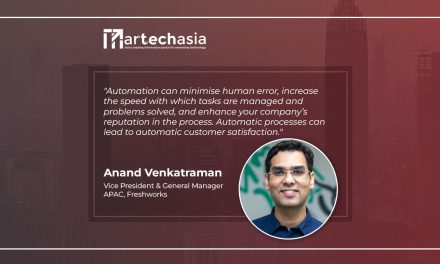How can marketers prevent fatigue and burnout with the right marketing tools and insights?
SG: Marketers will have to choose quality over quantity and understand that churning out more campaigns within a shorter timeframe will not always help to achieve their goals. Customers that find themselves bombarded by constant ads are also less likely to respond positively to any brand. Creating more campaigns will not only tire marketers but create ad fatigue among customers too.
Marketers need to take a step back and start thinking differently. The right tools, such as marketing automation, can help marketers to measure various metrics. Marketers can experiment with
analytics to gauge what truly clicks with their target audiences, craft more personalised brand messages across channels to capture their customers’ attention, and build a digital relationship based on trust.
- Investing in the marketing technology stack to drive better efficiency and positive business outcomes
- Not investing in the right MarTech stack has caused marketers to spend excessive amounts of time manually extracting and reviewing data, before transferring and using it. These time-consuming tasks may lead to fatigue and burnout in marketers, especially when dealing with insurmountable amounts of data.
- Marketers often struggle with churning out lots of reports and analysing them for insights. Poor analytics tagging, bad data input and lack of automation can cause marketers to burn out creating reports for everyone.
- By automating the data between systems via a central customer data platform marketers will be able to increase productivity and focus on driving better customer experiences and loyalty. Having an omnichannel platform helps marketers to orchestrate a cadence of touches instead of trying to be a data worker passing data into different systems.
-
Keeping pace with the evolution of technology
- Investing in the right MarTech eco-system is critical, especially as the technology landscape continues to quickly evolve with new MarTech tools.
- In doing so, marketers would be able to get improved features and capabilities, and in return drive better results than trying to fix legacy processes.
- To execute a seamless customer experience, marketers should evaluate their MarTech stack every 12-18 months, to see if there are opportunities to expand current capabilities.
How has ADA successfully helped businesses in Asia Pacific through the COVID-19 pandemic, and what more can be done in 2023?
SG: The challenges faced by businesses of all sizes, regardless of industries during the pandemic period, emphasised the need for businesses to have a proper digital strategy and connect with their audiences online.
ADA has helped businesses in Asia Pacific in 4 main ways:
-
Building customer experiences that matter
- In today’s crowded online marketplace, brands have to shout to be heard – and even that’s no guarantee. What’s more, product offerings are becoming undifferentiated, forcing marketers to turn to the one thing which can help them stand out and create a lasting impression: a robust digital customer experience (CX).
- CX is delivering customers what they want to have. This starts from a potential customer seeing an advertisement, to purchasing, and also post-purchase. In other words, we want to optimise the full experience in the entire journey.
- We have been doing this by leveraging and harnessing customer data. Most organisations have data in silos. At ADA, we consolidate this information to create the 360-degree view of the consumer which allows businesses to segment, personalise, and target customers with the right campaigns.
-
Helping the tech tools work together seamlessly to deliver topline growth
- Most brands have separate tech tools specifically built for online or offline campaigns. However, many are unable to ensure that these tech stacks are integrated to work seamlessly together.
- ADA works closely with decision makers to look at their full sales and marketing funnel with an always-on approach, to seamlessly fuse the online and offline data of customers to draw better insights, provide a more holistic customer experience for customers and deliver topline growth.
- For example, ADA partnered with Insider to implement the right algorithms powered by AI that will help enterprises deliver precise individualised cross-channel recommendations and uncover full revenue potential.
-
Managing the complexity
- As data privacy remain a key concern for consumers, ADA has helped clients navigate seamlessly through complex digital ecosystems. In doing so, ADA ensures that organisations manage their data in accordance to the evolving data privacy regulations.
- With platforms such as Google and Facebook consistently improving and expanding their algorithms, businesses need to select the right platform at the right time and push out customised messages for the targeted audiences.
-
Driving more effective marketing efforts for our clients
- ADA was able to support businesses across APAC in accelerating and guiding them on their digital transformation journey. Clients’ expectations are shifting from mass media KPIs to business performance and outcome as they allocate more of their resources to digital channels. At ADA, we have always believed that the only way to assist our clients in achieving this is through the deployment of marketing tech tools and on-demand real-time data.
- We deeply embedded ourselves in their businesses to build a more holistic digital strategy upstream and downstream using data and analytics, media and creatives. These data-driven strategies helped them emerge even stronger as they were able to capture their audiences in a more targeted manner during the pandemic.
- Some of our biggest clients include Unilever, Procter & Gamble, Laneige, BMW, Nestle, Burger King, Petronas, among others.
Even a well-known global fast-food brand such as Burger King wasn’t exempt from the effects of the pandemic as they saw a decline in outlet visits and plateaued growth. To attract new customers, ADA adopted a multi-pronged data-driven campaign to understand Burger King’s potential consumers. By conducting a comprehensive competitor analysis, ADA was able to help Burger King to differentiate themselves and create a distinct identity for the campaign.
ADA also extracted multiple data sets, such as data on footfall in specific locations, attributes and behaviours, to accurately predict the likelihood of a consumer purchasing from Burger King. This was extracted using Audience Explorer, a dashboard proprietary to ADA that tracks real-time data based on our Data Management Platform.
These insights enabled ADA to identify new customers to target, and set Burger King apart from its competitors, with a 12% increase in brand ad recall and achieved a 4% increase in brand consideration. The Burger King app also achieved an increase of average user signup every month by 4% and saw a decrease in drop off during registration from 35% to 19%.
In 2023 and beyond, ADA continues to be a data and tech-enabled digital marketing and commerce transformation solutions partner, and envisions to be the largest digital and tech services provider in APAC. We are focused on achieving this through the enablement of data and technology as part of every client’s sales and marketing transformation to deliver on the promise of digital. By doing so, brands can deliver the best ROI from their MarTech investment and elevate customer experience and engagement.



















